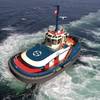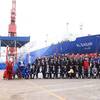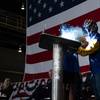Bureau Veritas (BV) is to class two projects for gas-fuelled vessels to be built for Canadian owners in Turkish shipyards.
British Columbia-based Seaspan Ferries has chosen BV class for two hybrid LNG/diesel/battery-powered ro-ro cargo ferries which will be built at the Sedef yard in Turkey.
Quebec-based Transport Desgagnes, meanwhile, has chosen BV class for two 14,000 dwt gas-fuelled asphalt/product tankers to be built at Besiktas.
Philippe Donche-Gay, Executive Vice-President and Managing Director of the Marine & Offshore Division, Bureau Veritas, said, “BV really knows LNG. We have extensive experience of handling LNG and using LNG as a fuel with our gas carrier fleet. Our ability to deploy that expertise for the benefit of shipyards and owners who are both breaking new ground was crucial to these owners entrusting BV with the classification of these vessels.”
The 148.9 m Seaspan ferries are due for delivery in 2016 and will operate on Canada’s west coast, carrying up to 59 trailers at speeds of up to 16 knots propelled by azimuthing drives. Twin dual-fuel W9L 34DF generators will be able to burn LNG from one single 200 cbm Type C tank below the main deck and there will be a hybrid battery pack power supply for generating zero emissions energy at quay or during maneuvering and for any low-load operation.
The Transport Desgagnes tankers will have two 300 cbm Type C LNG tanks on the deck powering the dual-fuel ME 5RT Flex 50 DF main engine and two 6L20DF engines and one 8L20DF auxiliary engine and two 3000 kW boilers.
Donche-Gay said, “Now that IMO has updated and adopted the IGF Code, the regulatory worries which were holding back owners have been removed and there are a host of new gas fuel projects about to start as owners take advantage of this clean and economical fuel. BV’s expertise in risk assessment complements its experience with gas carriers, which is why we are the class of choice for innovative gas fuel projects. We are currently engaged in gas fuel conversion or newbuilding projects involving chemical tankers, small-scale LNG tankers, LNG bunker tankers, cargo and passenger ferries, product tankers and tugs, and we expect to announce more in the near future.”
















